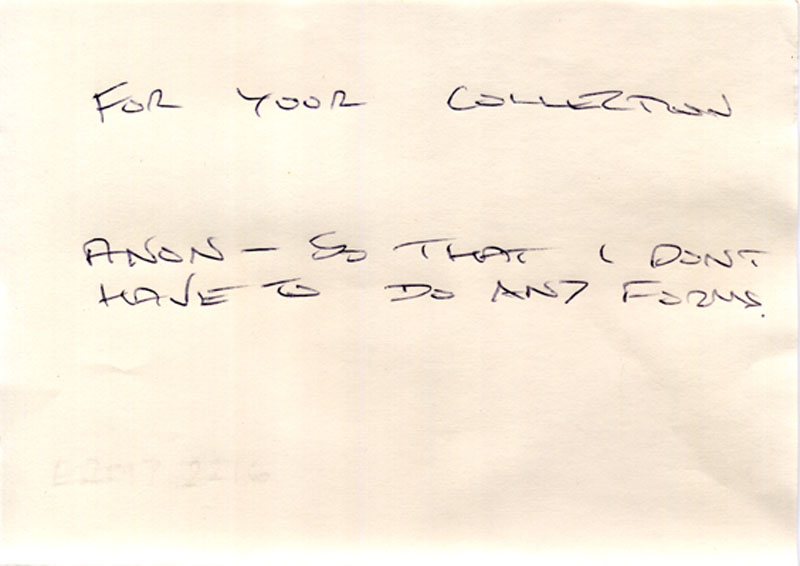We’ve had all kinds of things donated over the years, from a notebook kept by a textile merchant hoping to drum up business in Mumbai and Kolkatta, to the account books of an Altrincham woman’s home sewing business, via architects’ drawings for worker housing on Linotype & Machinery’s Broadheath estate.
Very occasionally, we receive archives from anonymous donors who send documents in the post or drop them off at the information desk during a visit to the museum. It’s often archive material that we really want to keep. The frustrating thing is that, without information about the person donating the archives and the story of how they came to own them, we can’t add these archives to our collections.
In museums and archives, we are keen on a thing called ‘provenance’. The word ‘provenance’ can mean different things, but we use it to talk about the authenticity or quality of an archive or object. For us, provenance is a record of ownership and, as well as assuring us that the thing we’re being offered is genuine, the story of an item’s ownership can often be as interesting as the item itself. It can guide us on how we use the item, whether we put it on display in a permanent gallery or make it accessible to researchers through our Study Area.
Recently, we received an interesting item through the post that tells us something about the transit of goods through Liverpool Road Station in the 1880s.

It might not look like much, but this slip of paper from 16 June 1882 tells us that a Mr Woodsley sent seven packages of cotton yarn weighing 9 hundredweight 2 quarters and 21 pounds (roughly 492kg) to James Smierton & Sons, merchants and manufacturers of Panmure Works, Carnoustie, Dundee. The yarn travelled on the London & North Western Railway through Liverpool Road Station before arriving in Dundee on 19 June 1882.
So here we have an item that could add something to the story we tell in our Revolutionary Railroad gallery and in our Textiles Gallery. Brilliant! We also don’t have anything like it from the same period. We have a bunch of invoices for goods coming through Liverpool Road Station in the 1920s, and a group of delivery instruction slips and despatch notes from the 1860s. We also have a warehouse stock book from 1885 found by archaeologists in the 1830 Warehouse when restoration work was about to begin. This little slip of paper fills a small gap in our collections.
So, ‘what’s the problem?’, I hear you ask.
The problem is in the lack of provenance. The only other thing in the envelope was a note.

And with those words, our kind donor stopped us from being able to add this item to the archive at the museum.
Museums work to a set of rules for acquiring objects and archives. We’re guided by the Museums Association Code of Ethics on acquisition. The Museum of Science and Industry is a publicly funded museum and has a reputation to uphold. Guidance on the ethics of acquisition says we must verify the ownership of any item being considered for acquisition, making sure that the current holder is legitimately able to transfer title to the museum. And, yes, that does mean that we ask people to complete a set of forms, but it’s just a signature, and our Registration team is very efficient.
So, what will happen to our lovely goods invoice from 1882? It’s remarkable that it has survived and we certainly won’t dispose of it. It will go into a form of limbo, recorded on our collections management system, available to staff for research, but not officially part of our permanent collection.
If you have something that you think would be a good addition to the collections at the museum, please get in touch with us. You can find out more about donating items to the collection on our website. If we don’t think an item fits with what we collect, we often know of other places where it could find a home.
And if our mystery donor is reading this, we’d be thrilled if you got in touch so that we can officially add this goods invoice to our permanent collection and say thank you for sending it to us.